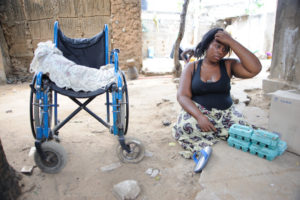Commentary written by Sara Palacios Arapiles, Committee Member of UAI in the UK and Doctoral Researcher at the School of Law, University of Nottingham
In an (nearly 100-page) Expert Report on “Access to Documentation for Eritrean Refugees in the Context of Family Reunification“, Dr Daniel R. Mekonnen and Sara Palacios Arapiles, discuss the practical realities and risks that Eritrean refugees face when trying to meet the documentation requirements demanded by some EU Member States (specially Germany) in the course of family reunification applications. In order to prove their identity or the family affiliation, Eritrean refugees are often requested to submit national ID cards, passports, birth and/or marriage certificates, in addition to their application for family reunification. Meeting these evidential requirements often necessitate appearing in person at Eritrean diplomatic missions, which “poses serious risks to Eritrean refugees and their relatives in Eritrea”, the report says.
In discussing the obstacles to obtaining official documents from Eritrea or via the involvement of Eritrean diplomatic missions, the report analyses the law and practice of the official documentation system in Eritrea, illustrating that Eritrea does not have a well-functioning administrative system. Rather, many life events (such as births or marriages) remain officially undocumented. It also discusses the practice at Eritrean embassies with regard to the issuance of official documents, with an emphasis on the current practice by embassies in the Sudan, Ethiopia, Egypt, Uganda and Kenya. This practice includes the payment of a so-called “2% diaspora income tax” and the signature of a self-incriminating statement, known as the “regret form”. The report shows that the provision of any service by Eritrean diplomatic or consular authorities is subjected to the fulfillment of these two “preconditions” which are coercive and abusive by their nature (see section 4 of the report). Yet, as well-documented in the report, some European governments (specially Germany) are now explicitly requiring Eritreans to fulfill these “obligations” in order to successfully process family reunification applications (see section 4.5.2 and Appendix 11 of the report). In addition, the report highlights that Eritrean embassies often refuse the issuance of documents to those regarded as political opponents to the Eritrean government, including refugees and asylum seekers or those recognizable as such, as well as to citizens who fled Eritrea after the peace agreement between Ethiopia and Eritrea (July 2018) or those who cannot prove the date of departure (see section 4.5 of the report). All things considered, complying with (strict) evidential requirements often hinder the realisation of the right to family reunification for Eritrean refugees, which is often the only way to ensure respect for refugees’ right to family unity and family life, and the principle of the best interests of the child.
The report further underscores that, in Ethiopia, Eritreans are experiencing difficulties in having their asylum claims registered with the Administration for Refugee and Returnee Affairs (ARRA). This, in turn, also affects family reunification processes; frequently, refugee status or a resident permit is needed to obtain an exit visa from Ethiopia (or another third country) for family reunification purposes. The report also states that, in the context of the eruption of the armed conflict last November in Tigray, northern Ethiopia, “Eritrean refugees have reportedly been exposed to various levels of dangers, such as abduction, killing, and forcible return to Eritrea (purportedly by Eritrean troops)” (see section 4.5.2. of the report). In relation to this, the report refers to the Human Rights Committee’s General Comment No. 15 on the position of Aliens under the International Covenant on Civil and Political Rights (ICCPR), according to which “in certain circumstances” foreigners may enjoy the protection of the ICCPR “even in relation to entry or residence, for example, when considerations of […] prohibition of inhuman treatment and respect for family life arise” (see section 4.5.2. of the report).
The findings in this report should be taken into consideration by embassies as well as authorities and courts across all EU member states to waive, when necessary, documentary requirements in family reunification procedures in compliance with EU and international law. In particular, article 11(2) of the Family Reunification Directive provides that “[a] decision rejecting an application may not be based solely on the fact that documentary evidence is lacking”. According to the Court of Justice of the European Union (CJEU), this provision does not leave a margin of appreciation in obliging EU Member States to “take into account other evidence” of the existence of the family relationship when documentary evidence is lacking. As the report discusses, in a preliminary ruling of 2019 that arose from the rejection of an application for family reunification lodged by an Eritrean citizen, the CJEU stated that it is “often impossible or dangerous for refugees or their family members to produce official documents, or to get in touch with diplomatic or consular authorities of their country of origin” (see section 5 of the report).
The Expert Report was commissioned by the German NGO Equal Rights Beyond Borders and the International Refugee Assistance Project (IRAP). It was co-funded by PRO ASYL and The Catholic Working Group for Migration. The full report is available at: https://equal-rights.org/en/news/report-documents-eritrea/
Photo credit © Valery Donevsky, ICRC Archives
The views expressed in this opinion piece do not necessarily reflect those of United Against Inhumanity.











